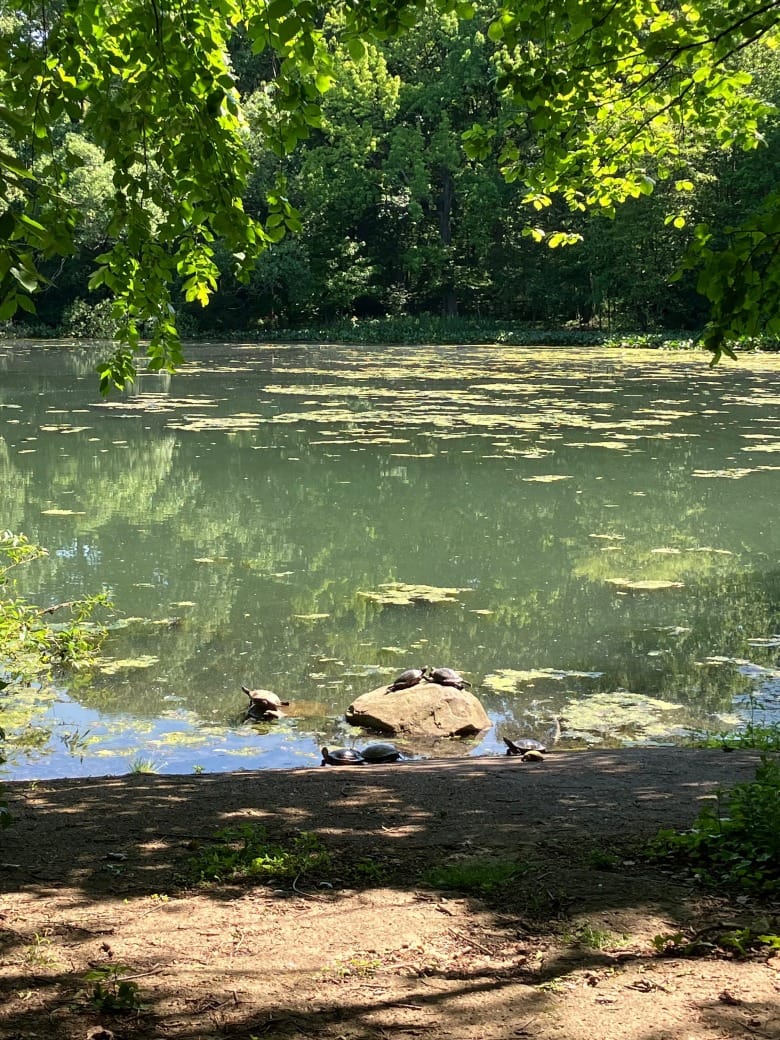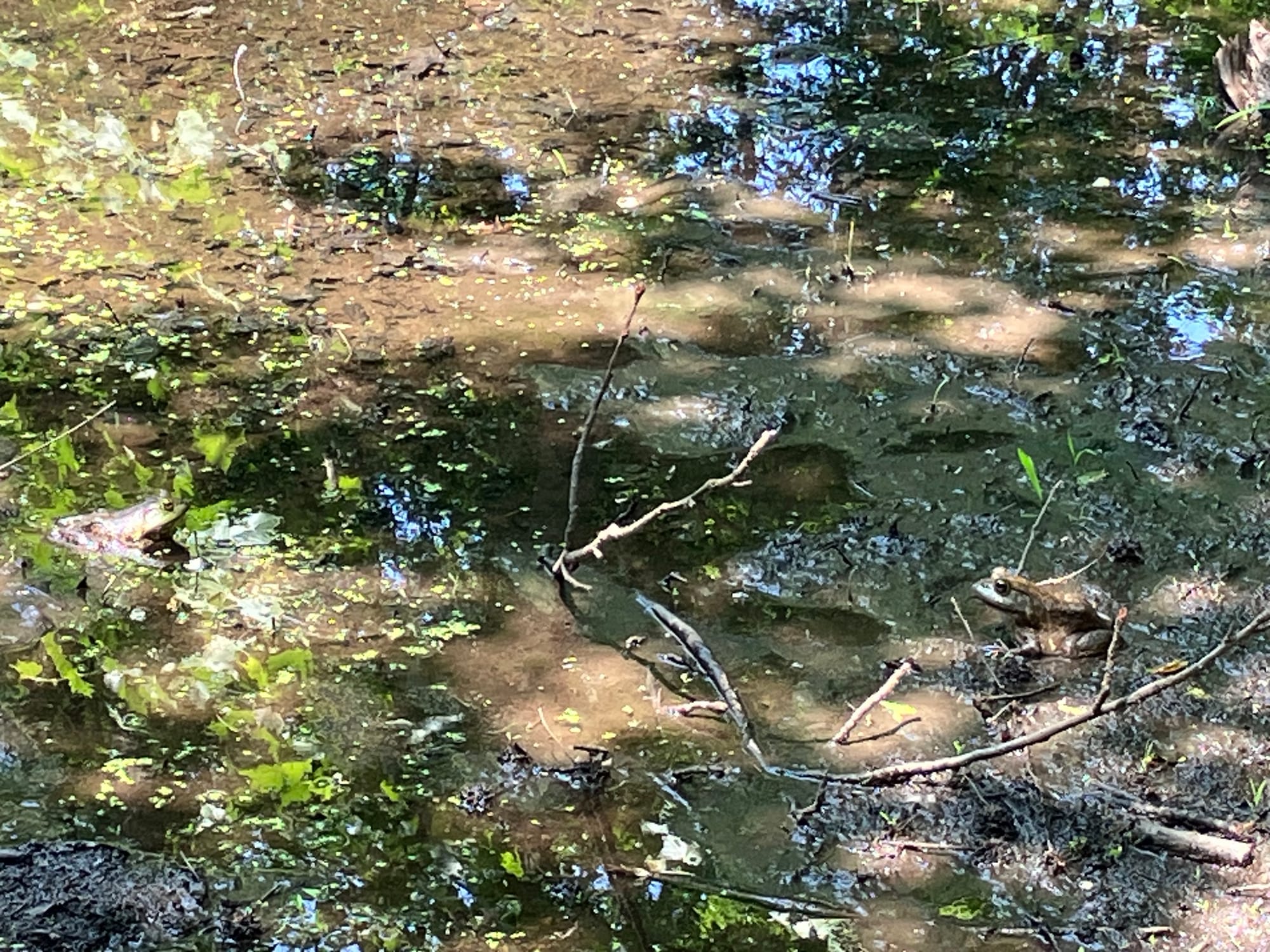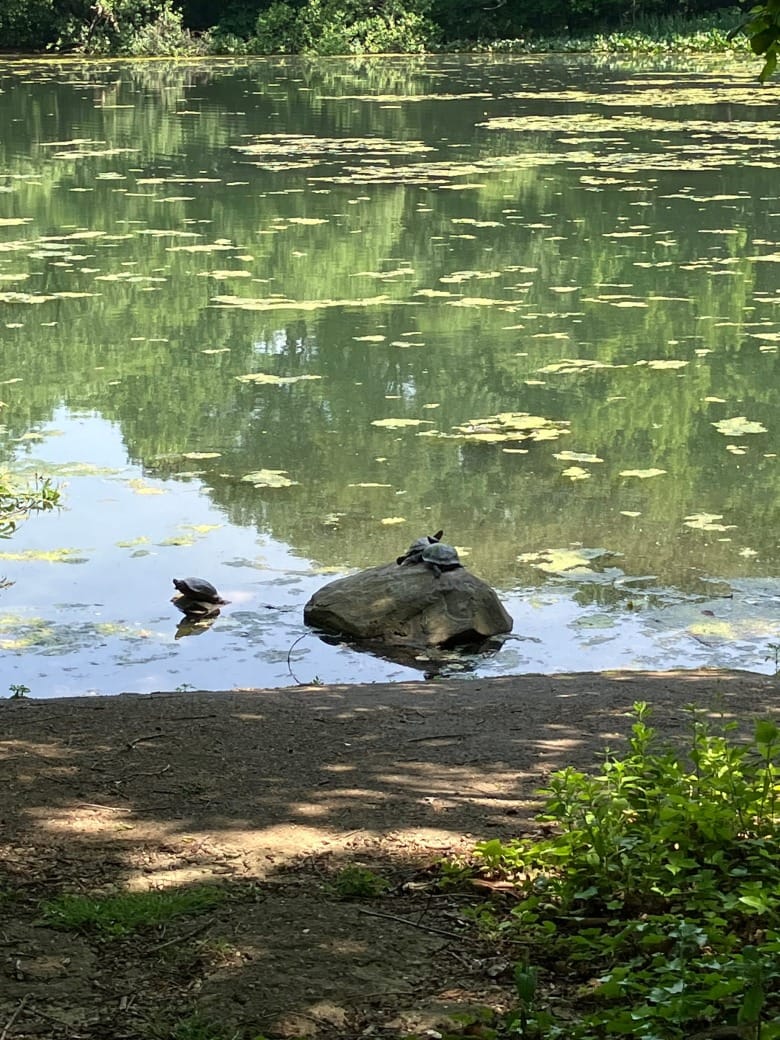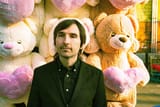#20 No Separation
Two short pieces about my beloved Prospect Park Turtle Gang and the transformative power of teaching

Welcome back to Growing at the Edges, thanks for clicking on this letter and including it in your information onslaught! Your reward is a poem and a song about my beloved gang of Prospect Park turtles. The very turtles I’m watching as I write these words in my notebook from a park bench. There’s something about their economy of movement, their ancientness, their shell as an inner place of retreat that makes them so compelling to visit day after day. Here’s the scene report for today:
The after-work sun kneels
peering through a keyhole
reanimated rocks
into playful baby turtles
forging trails through the algae
around the statuesque frog
In Mutual Benefit news, I recently played what will likely be my last show until autumn so my full attention can be on recording new songs. I’ve been periodically test driving and tweaking them at a small venue in south Brooklyn and the songs finally feel like full, ripe expressions. I always get quite daunted by starting the process of an album since it has the tendency to take over my whole life for years at a time but I’m hoping I can figure out a more balanced, mentally healthy way to work.
The day before the show I penned a quick little song inspired by the mindset of a haiku where it is simply situated observations without much focus on self. I like how it turned out so it might make its way onto the album in some form. You can hear the demo below :)

I’ve been thinking about the creative process a lot since my songwriting and creative unblocking teaching practice is in full swing. Initially I was hoping that songwriting could be a source of healing for my students but I wasn’t expecting the process to be so transformative for me too.
It’s no secret to readers of my newsletter that musicians have been deeply effected by recent technological and economic changes. Streaming and social media introduced perverse incentives to compete mercilessly for the user’s fractured attention as well as the algorithm’s mysterious blessing. Generative AI is in the process of relegating my job into the category of “unskilled labor” and eliminating opportunities that used to exist for my band. Lastly, the corporate consolidation and financialization of music venues, media, and labels has decimated the types of places that used to take a chance on us.
This would be a good moment to pause and shout-out the United Musicians and Allied Workers who are doing incredible work, please check them out or join! The current congressional bill they helped write would make a big difference for small musicians like me.
Mostly though, I have lost faith in recorded music as a commodity. Yet I know for a fact the moments where I am in a consistent creative flow are the most fulfilling in my life. It is something I want others to experience. So the idea came about to teach the conditions of a creative life with trust that the art will arise naturally. To de-emphasize the finished “product” itself and focus more on skills like sharpening and broadening attention, maintaining an inner space, synthesizing ideas, and participating in communities. This made more sense to me than teaching how to write a great song and then watching each student become crushed as the world seems to say “this has no value”.
As I nervously (over)prepared for my first class I brushed up on the ideas I wanted to use when teaching. I cracked open The Artist’s Way by Julia Cameron which teaches how to evade your inner critic so you have room to experiment without judgement. The Zen idea of mindfulness is a similarly powerful resource that teaches curiosity, attentiveness, but also non-judgment with yourself and your surroundings. Ideally, songwriting is a social practice so I like Jeff Tweedy’s idea that a song can have a dual role of excavating something from inside yourself but also meant to connect with others. Carl Jung has a treasure trove of writing about creativity and the dreamy, murky contents of the unconscious which are drawn from for the imagery of art. The book Stolen Focus by Johann Hari greatly influenced me about the power of attention and how others profit from siphoning it away. Most recently, Byung Chul-Han’s Vita Contemplativa goes very deep into the idea of inner space and what happens when time feels truly spacious instead of when it is simply recovery or preparation related to work.
The first couple months of lessons have come and gone and I still have a lot to learn but it has been incredible getting to know the students, seeing their first lyrics, learning their creative blocks and experimenting with how to get past them. I love being in a band too but figuring out my own philosophy and method of creation and watching it be helpful for others has been life-changing to me. Like one of those moments where a new path opens. It’s honestly been a rough couple years of struggling with what it means to be a musician in this time of rapid change and precarity so it has been powerful rediscovering meaning outside of what is happening in the industries themselves.
Last week I was watching a video about the Zen Master Dogen and the lecturer mentioned that in 13th century Japan there wasn’t a differentiation between art, spirituality, and daily life. That they weren’t seen as separate activities. In our society that is almost impossible to imagine yet I find the idea so beautiful and worth aspiring to. I think that might be the essence of what I am trying to both learn and teach.
Unlike the turtles, I can’t handle the direct afternoon sun anymore so I’ll head inside. Always feel free to drop a line or inquire about online lessons. I’m looking forward to writing more about the process and hopefully commissioning some illustrations for the next one. My goal is to eventually make these ideas into a zine.
Extreme gratitude for reading! Good luck on your journeys!
j+

